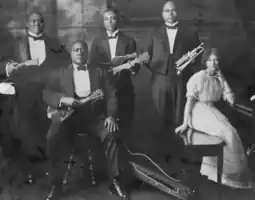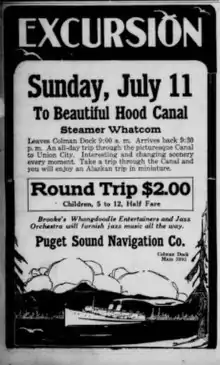Whangdoodle Entertainers
The Whangdoodle Entertainers, sometimes referred to as the Whangdoodle Trio, Whangdoodle Quartet, Whangdoodle Quintet, Whangdoodle Orchestra, and Whangdoodle Ensemble[lower-alpha 1] was an American jazz and ragtime band formed in Seattle, Washington. They routinely performed throughout the Seattle area from approximately 1907–1925.
Whangdoodle Entertainers | |
|---|---|
 The Whangdoodle Entertainers in 1914. From left to right, C.A. Hughes, F. R. "Ace" Brooks, H. T. Hollie, Frank D. Waldron, Coty J. Jones. | |
| Background information | |
| Origin | Seattle, Washington, U.S. |
| Genres | |
| Years active | 1907–1925 |
The Entertainers (trio, quartet, quintet, orchestra, or ensemble)
Although members of the group rotated, along with the name[1][2] of the group, the manager was "Ace" Brooks of Seattle, Washington.[1]
The first mention of the Whangdoodle Four occurs in a newspaper announcement in The Seattle Republican at the end of 1907.[3] A brief 1909 article in the Freeman: An Illustrated Colored Newspaper lists the members of the Whangdoodle Trio as P. G. Lowery, first mandolin; F.R. Brooks, manager, second mandolin; J.P. Faulkner, tenor, cello; F.E. Lowry, baritone, harp, guitar; and H.E. Mables, bass.[4]
A photo of the Whangdoodle Entertainers, from The Freeman newspaper, 1914, lists the members as C.A. Hughes, H.T. Hollie, F.D. Waldron, F.R. Brooks, and Coddy J. Jones.[5] The Whangdoodle Entertainers performed ragtime, string band music, and jazz.[6]
Members

- F.R., Frank "Ace" Brooks: Popular musician, vocalist, and comedian who toured the country. Manager of the Whangdoodle Entertainers.[7][8][1] Before forming the Whangdoodlers, Brooks performed with the Sherrah Quartette[9] which was part of a circus sideshow in 1900 and 1901 under P.G. Lowery's management.[10] A note in the February 16, 1901 edition of The Freeman states, "F.R. Brooks, better known as the "Easy going ace," keeps the house in a continuous uproar all the time he is on the stage. He is naturally one of the funniest comedians in the business."[11]
- Coddy (Coty) J. Jones
- P. G. Lowery: A touring musician, entrepreneur, and band leader, who was referred to as, "The world's greatest colored cornet soloist."[12]
- C.A. Hughes
- H.T. Hollie
- J.P. Faulkner
- F.E. Lowry
- H.E. Mables
- Frank D. Waldron: (1890-1955) A jazz cornetist, alto saxophonist, trumpeter, composer, bandleader, and music teacher who lived in Seattle, Washington.[13]
Notes
- Variations on Whangdoodle used in the press included Whang Doodle, Wang Doodle, Wangdoodle, and Whangdoodlers. Modern sources sometimes misspell this as Wang Doodle.
References
- "The Stage". The Freeman. September 11, 1909.
- "Advertisement: Pantages Theater". The Oregonian. August 26, 1908.
- "Personal and Social". The Seattle Republican. Vol. XIV, no. 31. Seattle, WA. December 27, 1907. p. 8. ISSN 2157-3271. OCLC 942694229. Retrieved March 3, 2021 – via Chronicling America « Library of Congress.
- "The Stage, F.R. (Ace) Brooks". The Freeman. December 25, 1909.
- "Whangdoodle Ensemble, Seattle". The Freeman. January 3, 1914.
- Armbruster, Kurt (2011). Before Seattle Rocked: A City and Its Music. Seattle: University of Washington Press. pp. 69–71. ISBN 978-0-295-99113-9.
- "Chicago". The Freeman: An Illustrated Colored Newspaper. July 20, 1901.
- "Column 1 page 5". The Freeman. January 9, 1904.
- A souvenir of the Season of 1900 Adam Forpaugh and Sells Brothers. 1900. p. 51.
- Abbott, Lynn (2007). Ragged but right : black traveling shows, "coon songs," and the dark pathway to blues and jazz. Doug Seroff (1st ed.). Jackson. ISBN 978-1-60473-148-4. OCLC 226379028.
{{cite book}}: CS1 maint: location missing publisher (link) - "Notes from W.I. Swain's Original Nashville Students". The Freeman. February 16, 1901.
- Watkins, Clifford E. (2003). Showman. Univ. Press of Mississippi. ISBN 978-1-61703-445-9.
- "Frank Waldron". burning ambulance. June 29, 2018. Retrieved February 25, 2021.
External Links
- Photo of Wang Doodle Orchestra [sic] held by the Black Heritage Society of Washington.
- "Mossback's Northwest - Frank Waldron & Wang Doodle Orchestra - Season 6". PBS.org. November 16, 2022. Retrieved November 17, 2022.